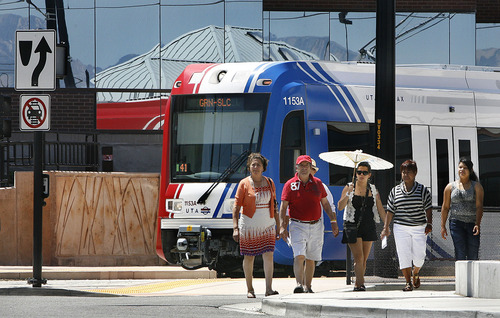This is an archived article that was published on sltrib.com in 2013, and information in the article may be outdated. It is provided only for personal research purposes and may not be reprinted.
The Utah Transit Authority Board asked representatives of key rider groups to tell it Wednesday what is good about its system, and what is not.
It heard complaints that fares are too high, recently reduced bus service should be restored, and that UTA should better explain executives' high salaries and bonuses. But groups also praised UTA's system in general, and wished aloud that more would use it to reduce congestion and pollution — and some even supported a sales tax hike to improve service.
Bill Tibbitts, associate director of the Crossroads Urban Center, said that the poor served by his center often talk about both the help and problems created by UTA.
He said the center found that 72 percent of its clients ride UTA sometime every month, and 42 percent use it four times a week or more. "They show it can get you where you want to go. They show it can actually work because they use it every day, and much more frequently than everyone else."
However, he said 59 percent of his clients also said they also chose not to ride transit sometime in the last month because it costs too much. "Your most loyal customers would use your service even more," if fares were cut, he said. "Price really is an obstacle."
Several other groups also said high fares may be the biggest problem UTA faces. TheTribune found earlier this year that UTA fares are among the highest in the nation, although UTA argues that its fares are similar to those of agencies that are most comparable in size and scope.
"It's too expensive and it takes too long," said Erin Mendenhall, acting executive director of Breathe Utah.
"The main issue is cost. I think we need to find a way to make transit half-price" from what it is now to encourage use, because transit usually will take more time and be less convenient than driving, said Roger Borgenicht, cochair of Utahns for Better Transportation.
Currently, fare for a one-way trip is $2.50.
The Rev. France Davis, pastor of Calvary Baptist Church, said UTA needs to do more to help the middle class — which does not enjoy some discounts and passes that are available to the very poor — "so that they are not cost out of transportation."
UTA spokesman Remi Barron said UTA is moving toward basing fares on distance traveled, instead of charging a flat fare for any distance. He said that may eventually help lower fares for some riders — such as those taking short trips. However, it could raise prices for those taking long trips.
The session Wednesday was the last of three retreats the board scheduled with politicians, business leaders and now rider groups to help it choose future priorities as it finishes its massive "Frontlines 2015" projects that expanded TRAX and FrontRunner lines.
Board member Charles Henderson said transit officials nationally hold UTA in high regard for such expansion. "Unfortunately, we don't have the same sentiment in our community" sometimes, he said, so it is meeting with groups about how to improve UTA's image and service.
Groups representing riders including university students, the disabled, the poor and even bicycle enthusiasts on Wednesday generally praised UTA expansion, partnering with schools and businesses to provide low-cost passes, improvements in pushing safety and making trains more accessible for the disabled.
Besides complaining about high fares, they also called for restoring bus service that had been cut to help pay for rail, expanding night service, improving a web page they say is hard to navigate, making changes less often to schedules and improving trust by better addressing high UTA salaries and wages.
"I think public trust in the board is something that really needs to be worked on. We all know that from reading the newspapers," especially stories about high bonuses and salaries, Mendenhall said. The Tribune reported recently, for example, that UTA executives split $750,000 in bonuses last year — with top executives getting $25,000 apiece — for goals that critics said are too easy to achieve.
"UTA needs to more fully explain why bonuses are being given to executives," said University of Utah student Leo Masic. "Right now, I think the public image of UTA is not where it should be and I think that ultimately hinders ridership.... You never want to have ridership not build simply because public image is decreasing."
Among the calls for more bus service, Borgenicht said, "UTA has done an incredible job of building the backbone that's going to make us a transit metropolis for decades and generations to come" with new TRAX and FrontRunner lines. "We built a backbone, but we really have got to focus on how to connect the ribs and connective tissue to the system."
Some groups also endorsed the idea of raising sales tax for transit from a current average of 0.6 cents to a full penny per dollar purchase — which UTA has said is needed for projects included in its long-range plans and for bus-service expansion.
"We need to do something to jump start the system to get money into the system so that it can work effectively. I think that without that, I don't see much hope" for increasing ridership, said Pat Boyle, chairwoman of UTA's Committee on Accessible Transportation, which advises on serving the disabled.



